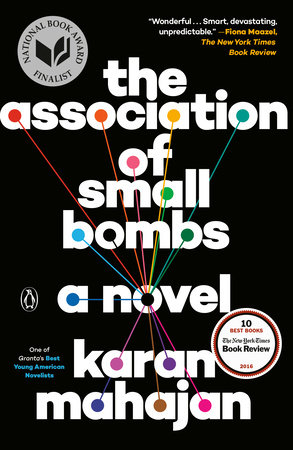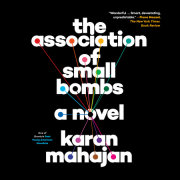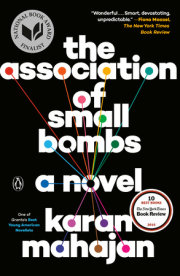National Book Award Finalist
“Wonderful. . . . Smart, devastating, unpredictable, and enviably adept in its handling of tragedy and its fallout. If you enjoy novels that happily disrupt traditional narratives—about grief, death, violence, politics—I suggest you go out and buy this one. Post haste.”
—Fiona Maazel, The New York Times Book Review
“Brilliant. . . . Mr. Mahajan’s writing is acrid and bracing, tightly packed with dissonant imagery. . . . The Association of Small Bombs is not the first novel about the aftermath of a terrorist attack, but it is the finest I’ve read at capturing the seduction and force of the murderous, annihilating illogic that increasingly consumes the globe.”
—Sam Sacks, The Wall Street Journal
“[Mahajan’s] eagerness to go at the bomb from every angle suggests a voracious approach to fiction-making, a daring imaginative promiscuity that moves beyond the scope of his first, very good novel, Family Planning. . . . Tragedy deepens Mahajan’s range. In the first few pages of his new novel, he renders the spectacle of the bombing with a languid, balletic beauty, pitting the unhurried composure of his prose against the violence of the events it describes. . . . Mahajan has a cinematic attunement to the spectacle of disaster, and he often focuses on the minor rather than the grandiose, to eerie effect.”
—Alexandra Schwartz, The New Yorker
“A deeply moving exploration of terrorism that destroys the tropes of the subcontinental novel. . . . In flitting between the perspectives of terrorists and victims, parents and children, Hindus and Muslims, Mahajan has committed to a radical and extended act of empathy. . . . Where other authors concede the clash between the West’s physicality and the East’s spiritualism, Mahajan deftly shows how fundamentally reliant each is on the other, and, consequently, how silly the binary truly is.”
—Sharan Shetty, The Slate Book Review
“A singularly intelligent novel.”
—Parul Sehgal, The New York Times Book Review
“[A] beautifully written novel. . . . Ambitious. . . . Carries us deep into the human side of a tragedy. . . .”
—The Washington Post
“When two brothers are killed in an explosion in Delhi, it forever changes the lives of the boy who was with them, the parents who mourn them and the man who made the bomb.”
—Time, “A Best Book of 2016 So Far”
“A complex meditation on violence, fundamentalism and grief. . . . A superb novel. . . . A careful, discriminate and moral work of art.”
—Luke Brown, Financial Times
“A mind-blowing book on many, many levels. The characterisation is extraordinary. . . . A very extraordinary book.”
—BBC Radio 4, Saturday Review
“Even when handling the darkest material or picking through confounding emotional complexities, Mahajan maintains a light touch and a clarity of vision. . . . He is particularly adept at capturing the quicksilver shifts of mood that accompany states of high emotion. . . . Mahajan shows immense perspicacity in his handling of Deepa, and of the other women in the novel. . . . Mahajan’s novel is as much a chronicle of the cascading effects of the opening of India’s economy and the global response to 9/11 as it is about a bomb explosion in a down-at-heel neighborhood market. . . . In the end the Lajpat Nagar bomb, like the plot of a novel, is at the beck and call of the writer who conjured it. Except that instead of dooming his characters all at once, Mahajan picks them off with abrupt indifference, like a lone shooter, one by one.”
—Deborah Baker, London Review of Books
“The pitfalls of the terror novel are crudity, fetishization of the terrorist’s mind, and over-attention to the obvious, but Mahajan’s book suffers from none of these. He’s proved that the job can be done with subtlety and an eye for the fine grains of daily life, and not without comedy or irony.”
—Christian Lorentzen, Vulture.com’s “Best Books of 2016 (So Far)”
“A tour de force of psychological probing and empathy.”
—The Austin-American Statesman
“Darkly incisive . . . timely. . . . In Mahajan’s riveting and intricate story, the aftershocks of small bombs are as inescapable as their explosions.”
—Vice
“Karan Mahajan’s The Association of Small Bombs urgently depicts the toll of terrorism on victims and perpetrators.”
—Vanity Fair
“Writing as brave as you will find it. . . . Cumulative, unnerving, and surprising.”
—Jonathan Sturgeon, Flavorwire
“Mahajan’s small touches—especially his insight into how people react to trauma and loss—are succinct and persuasive. . . . Mahajan has a lot on his mind in The Association of Small Bombs. . . . He’s a voice well worth heeding.”
—Michael Upchurch, The Chicago Tribune
“The architecture of the novel is brilliant in its literary exploration of the aftermath of small bombs. . . . Propulsive. . . . The dark humor keeps the novel lively rather than overdetermined. . . . Powerful, unsettling. . . . The Association of Small Bombs is a thing of loveliness—its structure and concept are a marvel.”
—The Los Angeles Review of Books
“A wise, searing, sculptural approach to the roots and aftermaths of terrorism and radicalization. . . . Mahajan has mastered a nonpareil 360-degree portrait of one of the most disturbing, least understood malaises of our time.”
—The Millions
“Nothing short of a tour de force. . . . Line for line, it is a wry and also a wrenching book, at once a lesson in Indian political culture and a lesson in centripetal force—for however far these characters travel psychologically, they are always tethered to the bomb.”
—Katherine Hill, The Philadelphia Inquirer
“Just like its beautifully designed cover, The Association of Small Bombs is simple in premise, but it explodes in bursts of brilliant color. Karan Mahajan’s masterful novel explores the aftermath of a small bomb detonation in the '90s in Delhi, and the many people whose lives it alters—from the families of victims to the bombers themselves. With great empathy and no lack of humor, Mahajan shows the multitudinous sides to the kind of story that we usually read a line or two about in a newspaper, or hear short mention of on television.”
—Maris Kreizman, Esquire’s “Best Books of 2016”
“A psychologically intimate and stylistically compelling examination of the ripple effects of small acts of terrorism. . . . In a post-9/11 world, this novel should be considered a must-read.”
—The Huffington Post
“A deeply compassionate exploration of the effects terrorism has on both the victims and the perpetrators. . . . Dark, devastating, and sharply wise, The Association of Small Bombs is a tale of loss, grief, guilt, and redemption.”
—Buzzfeed, “Most Exciting Books Coming in 2016”
“A sweeping, gripping narrative composed of multiple perspectives. . . . Mahajan astounds with his devastating study of violence. Not every writer can tap into the mindset of a bomber – Joseph Conrad triumphed in The Secret Agent whereas John Updike failed in Terrorist – but Mahajan pulls it off with chilling results.”
—Malcolm Forbes, The National
“Rarely have I read a novel more timely. . . . The all-encompassing blanket of tragedy brought on by a ‘small bomb’ makes this novel personal and poignant.”
—The Missourian
“A fast-paced examination of a minor terrorist act in mid-nineties New Delhi, told in a cinematic (better yet: televisionary) third person.”
—Oxford American
“Beautiful and evocative . . . a compelling story about extremism and its effects.”
—BookPage
“This one will hit you hard. . . . Powerful, breathtaking, and unforgettable, this book pulls out dynamic insight on the effects of terrorism on its victims.”
—Bustle
“Besides having one of the most instantly memorable titles for a novel in recent memory, Karan Mahajan’s new novel explores the life of a young man in the aftermath of a horrific event that takes the life of two of his friends. With a story that crosses continents and addresses questions of nationalism, terrorism, and the effects of violence, this novel seems ready to engage with some of our era’s looming issues.”
—Vol. 1 Brooklyn, “March 2016 Books Preview”
“Mahajan’s talent is in conveying the sense that the world is gray, not black-and-white, and he accomplishes this by weaving together the evolving motives and passions of his characters so intricately that in the end we see each as culpable, and human. In his searing story, lives (and life itself) are subjected to close inspection and at times discombobulation.”
—Publishers Weekly
“In the virtuosic opening of Mahajan’s timely second novel, he writes, ‘a good bombing begins everywhere at once.’ This setup works well for the broad array of story lines connected to a 1996 detonation of a small but potent bomb in a humble Delhi marketplace. . . . The anchoring characters are Mansoor and Shockie, a Kashmiri bomb maker who refers to his deadly art as ‘making chocolate,’ even as he worries about his victims and his ill mother. Mahajan’s terrorists and social activists are never content to settle into one venue or mindset.”
—Booklist
“[Mahajan is] strong at exploring the very long shockwaves of small-scale violence.”
—Kirkus Reviews
“With The Association of Small Bombs . . . [Mahajan] may well have moved into the upper reaches of contemporary fiction.”
—Flavorwire, Most Anticipated Books of 2016
“In this fine novel, Karan Mahajan has achieved a brilliant and distinctive success. The sources, and unbearable, unending, consequences of a terrorist atrocity constitute a subject extremely difficult to capture in a work of serious literature. But with his intelligence, humanity, and art, Mahajan has given us a deep portrait of life in a kind of darkness.”
—Norman Rush, National Book Award-winning author of Mating and Mortals
“Karan Mahajan is a writer with great command and acute and original insights. He offers what few can: a stereoscopic view of reality in dark, contemporary times.”
—Rachel Kushner, author of the National Book Award Finalist The Flamethrowers
“Like a Russian novel set in India, Karan Mahajan’s Association of Small Bombs has the sweep, wisdom and sensibility of the old masters. Here the humor of Bulgakov and the heart of Pasternak deliver an exploded-view of a small bomb that goes off in a minor market in a corner of South Delhi. Like shrapnel, themes of suffering, dislocation and redemption radiate from the blast, and none will be spared Mahajan’s piercing gaze. Urgent and masterful, this novel shows us how bystander, bomber, victim, and survivor will forever share a patch of scorched ground.”
—Adam Johnson, author of the National Book Award winner Fortune Smiles and the Pulitzer Prize winner The Orphan Master’s Son
“The Association of Small Bombs is a wondrous, devastating novel—packed with small wonders of beauty and heartbreak that are impossible to resist.”
—Dinaw Mengestu, MacArthur “Genius” grantee and author of All Our Names
“The Association of Small Bombs is a brilliant examination of aftermath, how life is built of consequences, both imagined and unimagined, the tight web of human life and human sympathy. Karan Mahajan knows everyone, on every side of a detonation: the lost, the grieving, the innocent, the guilty, the damaged. It’s hilarious and also devastating. Karan Mahajan is a virtuoso writer, and this is a wonderful book.”
—Elizabeth McCracken, Story Prize-winning author of Thunderstruck & Other Stories
“A gripping, timely, and moving novel by a writer of enormous talent.”
—Geoff Dyer, National Book Critics Circle Award-winning author of Otherwise Known as the Human Condition
“Packed with insight into the minds of a diverse cast of characters, The Association of Small Bombs is often breathtaking in its wisdom and maturity. With one sharp observation after another, Mahajan renders a picture of religious and political tension in Delhi that is as unforgettable as it is heartbreaking.”
—Adelle Waldman, author of The Love Affairs of Nathaniel P.
“Karan Mahajan’s thoughtful, touching and perfectly pitched account of two marketplace bombings and the casual havoc they cause in a handful of Delhi families is almost subversive in its even-handedness and its charity. For all its unflinching—and unnerving—fatalism, The Association of Small Bombs is an unusually wise, tender, and generous novel.”
—Jim Crace, author of the Booker Prize finalist Harvest
“The Association of Small Bombs is an utterly brilliant book. Rarely does one encounter a work as masterful in the precision of its writing or as penetrating in the insights it provides. Karan Mahajan is a writer to be admired.”
—Kevin Powers, author of the National Book Award Finalist The Yellow Birds
“Karan Mahajan is daring comfortable readers to make an uncomfortable connection: between the bomb that goes off on the first page of his book, and the way the pages that follow seem to scatter, in bright-hot shards of heartbreaking story. The Association of Small Bombs, which tracks the aftermath of a blast in Delhi in 1996, is a work of disabused intelligence, and staggering compassion—for the victims, and even for the terrorists, all of whom are rendered whole, even if they’re in pieces. Its political subtlety is laudable for how relentlessly it’s paced, and the grace of its prose acts like a balm to its trauma. Mahajan’s sense of fiction as the history behind history puts him in league with Joseph Conrad, and like Conrad he succeeds brilliantly at writing past Empire, by relating the newest of news-cycles to the oldest of tale-cycles.”
—Joshua Cohen, author of Book of Numbers
Praise for Family Planning
“Profound . . . Mahajan is only 24 years old, but he has already developed an irresistible voice with a rich sense of humor fueled by sorrow.”
—Ron Charles, The Washington Post Book World
“The truest portrait of modern New Delhi I’ve read.”
—Suketu Mehta, author of Maximum City
“Family Planning is one of the best and funniest first novels I’ve read in years.”
—Jay McInerney, The Daily Beast
“Brave, breakneck, and amusing . . . A fearless cultural domestic tour . . . Irreverent, fresh, and sometimes, given its author’s youth, preternaturally wise . . . Almost every page bears a passage worth quoting.”
—The San Francisco Chronicle
“Mahajan packs this hyperbolic blast of a novel with scathing reflections . . . . The rhythms of [New Delhi’s] English, the tangle of its bureaucracies, the sights, sounds and smells of its streets—all spring to hectic life.”
—Michael Upchurch, The Seattle Times
“Highly entertaining . . . The level of concision, insight, and humor on display in Family Planning is rare from any writer, but particularly one so young.”
—Maud Newton, NPR Books We Like
“[A book] I’d love to ‘gift’ . . . is the coming-of-age comedy Family Planning, by the 24-year-old wunderkind Karan Mahajan. . . . I love the way Mahajan sees family life.”
—Liesl Schillinger, The Huffington Post
“Karan Mahajan combines take-no-prisoners satire with haunting insights into the human condition.”
—Manil Suri, author of The Death of Vishnu










